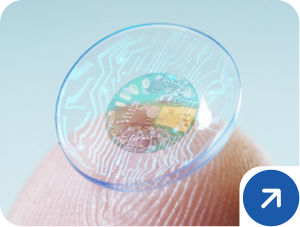Dry eyes aren’t just inconvenient—they’re often extremely frustrating, and they may require treatment to resolve. This condition tends to develop slowly, and it leaves your eyes feeling gritty, sore, and tired. It’s easily recognizable by a constant stinging sensation that makes you constantly want to rub your eyes. But can dry eyes also cause blurred vision?
Blurry vision is an extremely common symptom of dry eyes. This is because of how dry eyes affect the surface of your eye, causing light to scatter in a way that’s harder for your eyes and brain to interpret.
What Are Dry Eyes?
Your tears are responsible for protecting your eyes. They help keep the eye safe from bacteria, dirt, and debris. They also let light pass through on its way to the internal parts of your eye.
However, your tears need several components to function properly:
- Mucus, which attaches the tear film to the eye and spreads it evenly.
- Water, which helps the eye flush away harmful bacteria and particles.
- Oils, which protect the other layers to prevent evaporation.
Sometimes, the glands that produce the oils and water for your tear film are compromised. This leads to dry eye, an extremely common eye condition.
The Types of Dry Eyes
Dry eyes can be broken down into 2 categories:
- Evaporative dry eye, where the oil-producing meibomian glands are impacted or blocked. This leaves the tear unprotected and vulnerable to early evaporation.
- Aqueous-deficiency dry eye, where the water-producing lacrimal glands don’t have enough liquids. The eye struggles to produce enough tears.
To put it simply, when a person has dry eye, their tears are either of too poor quality or simply don’t have enough moisture to do their job.
What Causes Dry Eyes?
The human eye is extremely sensitive. It’s easily affected by all kinds of underlying conditions and outside causes. Dry eyes are often caused by:
- Age-related changes in the eye that cause decreased tear production.
- Environmental factors, such as constant exposure to wind, smoke, or pollution.
- Underlying medical conditions, like Sjogren’s syndrome or rheumatoid arthritis.
- Certain medications, such as antihistamines, antidepressants, and birth control pills.
- Lifestyle factors, including smoking, diet, and hydration.
When one or more of these factors are at play, the eye can easily become inflamed. This causes the tell-tale stinging sensations of dry eyes.
Dry Eyes: Common Signs & Symptoms
The first sign of dry eyes is often chronic irritation. You might notice that your eyes are more sensitive than usual and easily inflamed. This can lead to:
- Redness and irritation
- A gritty sensation
- Sensitivity to light
- Mucus around the eyes
- Watery eyes as a response to dryness
These symptoms can be extremely irritating to deal with. Dry eye as a condition can also be temporary or chronic, which makes flare-ups a common problem when you’re in harsher environments.
Why Do Dry Eyes Cause Blurry Vision?
Your tear film is naturally clear. This lets light pass through unobstructed to reach through the inner parts of your eye. Tears are a key part of your visual system. However, when the tear film is unbalanced, the surface of the eye can become uneven.
This uneven surface alters the direction of light as it passes through the eye. Instead of focusing on a singular point, these light rays refract or scatter through the eye. This makes it harder for the brain to create a clear image of the light your eyes see.
It helps to think of this effect as being like a rain-scattered windshield. While you may see semi-clearly, there are blurry spots where the light is unpredictable. This can be frustrating to deal with in your everyday life and can be extremely inconvenient. So what can you do?
How to Treat Dry Eyes
Preventive measures are key to avoiding dry eyes. Like many medical conditions, prevention is often easier than treatment. If you deal with chronic dry eyes, try to:
- Stay hydrated by drinking plenty of water throughout the day
- Use a humidifier in your home to add moisture to the air—especially if you live in a dry climate.
- Wear sunglasses to protect your eyes from harsh sunlight and wind.
- Avoid environments with excessive smoke, wind, and dry air when possible.
- Eat a diet rich in omega-3 fatty acids and other essential nutrients to support eye health.
If you’re already dealing with symptoms, make sure to visit your optometrist as soon as you can. There, you can discuss using specialty eye drops for dry eyes, warm compresses, or even in-office treatment if necessary.
What to Do if You Have Dry Eyes
If you’re dealing with dry eyes, don’t suffer in silence—not when our team at West Coast Optical can help! We know how frustrating that constant stinging sensation can be, and we’re ready to help you. You deserve relief, and we’re here for you, so book an appointment with us today! Clear vision could be just around the corner.















